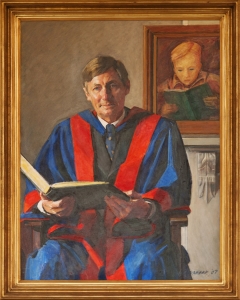Preacher: The Very Rev’d Frank Nelson, Dean
In a few days’ time Australia, like much of the world, will stop for Christmas. For those who come to churches and cathedrals like this one it will be a time of joyous celebration of the birth of Jesus. For many there is no religious significance and it is a happy time of family gatherings, gift-giving and gastronomical overindulgence. For some it will be a time to pour scorn on the perception of a god that few Christians believe in. But today, the 21st December, the Christian Church remembers someone more closely associated with Easter and the resurrection of Jesus Christ from the dead. That person is Thomas, one of the twelve close friends chosen by Jesus to accompany him on his peripatetic teaching and preaching ministry. Thomas is not remembered for any great heroics, or betrayal or denial – but for being honest enough to express his doubts.
The story is told in John’s Gospel. On the first Easter Day the disciples of Jesus were gathered behind locked doors, terrified that they would be the next to be rounded up and executed. Suddenly Jesus appeared in their midst and spoke to them. Thomas was not there and could not believe their story. He wanted proof. He wanted to see the mark of the nails, put his finger into the wounds. No blind faith for him. Thomas is often referred to as the doubter. (John 20: 24ff) His story invites us to consider the problem of faith and doubt, and to realise that they are not opposites at all. In fact, doubt is a very healthy part of faith, described by one person as ‘faith at the crossroads’. (Os Guinness)
You see, for faith to be genuine, there has to be an openness to the possibility of it being wrong, of not being able to ‘prove’ whatever is the object of faith. It takes considerable courage to be honest enough to face one’s doubts, especially where God is concerned, and especially when you are facing the last hours of your life. In the last significant conversation John Bannon and I had, just twelve days ago in my office here at the Cathedral, we talked a lot about doubt. He said, as he had said to me before, that he struggled with faith, struggled to believe – his intellect, his honest searching and probing would not allow anything simplistic. Yet he felt drawn, as he had done most of his life, to this God in whose name we meet today. I can assure you it is not an easy conversation to have with someone who, facing imminent death, desperately wants certainty about the future. I had no easy or flippant answers.
We talked about the nature of faith and doubt. We talked about the honesty expressed in the psalms, the ranting and raving at God on occasion by the psalmist. We talked about the sort of thing that St Paul expressed in the second of today’s readings – both the idea that ‘when I became a man, I put away childish things’ and that ‘now we see through a glass darkly’. (1 Cor 13: 11 & 12) If Paul, one of the greatest exponents ever of Christianity, could confess to his doubts, nicely expressed in the image of looking through a cloudy mirror, perhaps there is hope for people like John and me too.
John asked that, if at all possible, his favourite anthem be sung by the Cathedral Choir. The Book of Job contains the honest wrestling of a man beset by problems not of his own making. Perhaps that is why it appealed to John Bannon. After enduring much well-meaning, but unhelpful, advice from his friends and family, Job demands answers of God. Instead of answers Job gets a series of pretty profound questions based around a single premise. Who is Job to expect to understand the mysteries of the universe? Through chapter after chapter Job is asked whether he was there, whether he can possibly grasp the enormity and complexity of the universe. In a nice, but obviously unintended South Australian touch, the composer of the anthem we will hear shortly uses words from Job chapter 28 – which asks Job to consider those who mine deep underground, searching for the treasures hidden under the earth. Not even those who plumb the depths of the earth can find or understand God.
Listen for the question posed by Job and expressed through the music of William Boyce: Where shall wisdom be found? The answer, according to Job, is that the fear (honest and open faith) of the Lord is wisdom, and to depart from evil is understanding.
I suggested to John that if the God he worshipped could not cope with his doubts, that god was probably not worth worshipping. That idea struck a chord and he relaxed. Shortly after that conversation John and Angela attended Evensong, sitting behind me in the choir stalls. As we do each week, the choir sang the Nunc Dimittis, words said to have been uttered by an old man Simeon who, on being presented with the baby Jesus in the temple said he could die happy for, to quote the song, ‘mine eyes have seen thy salvation, which thou hast prepared before the face of all people, to be a light to lighten the Gentiles and to be the glory of thy people Israel.’ (Luke 2: 29 – 32).
It will be with those words that this service ends.
Full Order of Service: The Hon Dr John Charles Bannon AO Order of Service





